
REPORT ON SIERRA LEONE’S PARTICIPATION AT THE 2ND ANTALYA DIPLOMACY FORUM HELD IN ANTALYA, TURKEY – 11TH TO 13TH MARCH 2022
Background
The Antalya Diplomacy Forum is aimed to create a dialogue platform that will enable leaders, politicians, leading academics, thinkers, opinion leaders, diplomats, and business people to come together every year to address global and regional issues from a visionary point of view and to propose solutions to problems. The Forum is expected to contribute to the formation of new ideas, trends and shaping the agenda and discourse related to the future of the whole world.
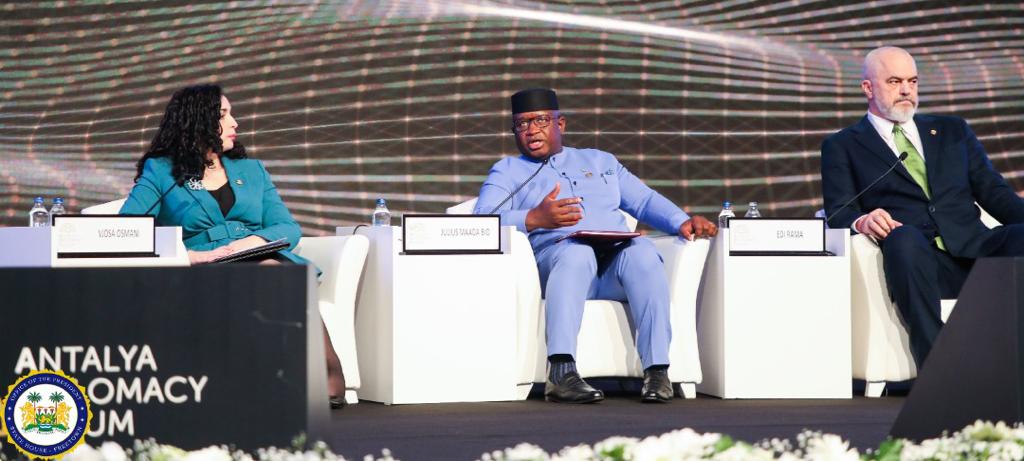
Sierra Leone's President H.E. Maada Bio (C)
Synopsis of the Second Antalya Diplomacy Forum
Heads of State and Government, Ministers, political thinkers, diplomats, business leaders, academics, members of think tanks and representatives of youth and the media met again on 11-13 March 2022 at the Second Antalya Diplomacy Forum, which was held under the auspices of the Turkish President Recep Tayyip Erdoğan.
Under the theme "Recoding Diplomacy", participants discussed many issues in the context of international relations.
It was noted that diplomacy is really undergoing a transformation. Language and methods vary. Competition and conflicts are common in international relations. These affect humanity with their changing dynamics. New fluctuations in global relations aggravated by the Covid-19 pandemic have increased the need for transformation. The changes in relations between the state and the individual and technological innovations are also remarkable.
The forum indicated that humanity needs strong diplomacy to resolve tensions, manage change, facilitate harmony and promote cooperation. For this, delegates avowed that diplomacy must remain innovative, efficient and effective. Therefore, it needs joint efforts to reassess, revalidate and reconfigure, in other words, recoding.
As a systemized and institutionalized way of communication, negotiation and representation, the forum underlined that diplomacy allows states to develop common solutions in cooperation between parties with different perspectives.
It was pointed out that diplomacy, although sometimes it seems that way, has never been static. Due to the nature of the subject and its purpose, diplomacy has always been tested by political, economic, social and technological changes. As dynamics, actors and tools change, diplomacy must adapt to them to remain fit for purpose.
In view of this year’s thematic concern, participants stated that recoding diplomacy involves finding effective ways to convey national interests with renewed language, influence and understanding, while using rapidly changing and innovative digital capabilities in a comprehensive way.
Arguably, the forum further dilated that throughout modern history, diplomacy's response to events has been strong. Over the centuries, war and peace, as well as fundamental changes, had passed the tests that have been demonstrated over time. This has been achieved through with adaptability and innovation.
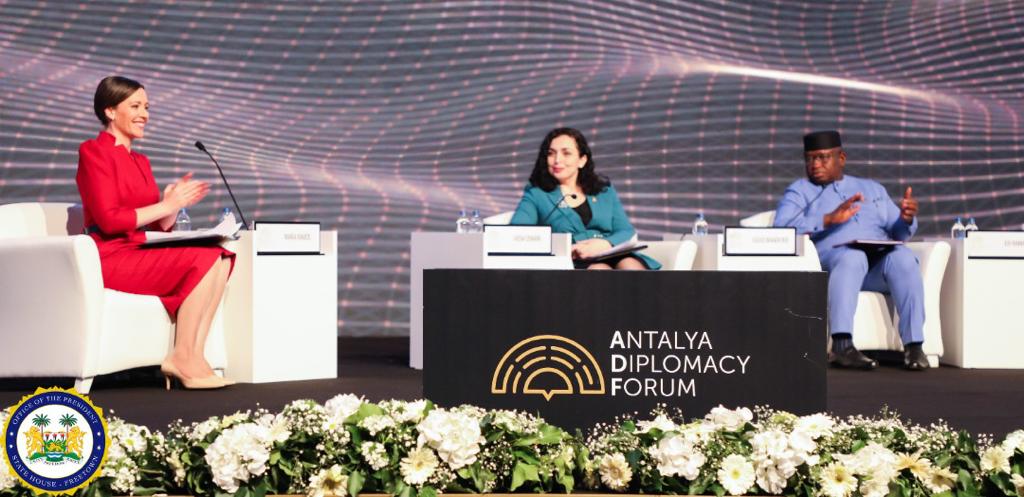
Sierra Leone's President H.E. Maada Bio (L)
It was emphasized that numerous tools, from bilateral agreements to global agreements, have institutionalized law and communication between nations. Diplomacy has thus progressed, for example, from special missions to embassies, from ad hoc conferences to multilateral forums.
It was highlighted that reaching younger generations is one of the most important priorities. Various participants stressed that Governments' attitude towards the inevitable phenomenon of change is shaped by their experience in the face of local, regional and global challenges. To this end, they maintained that diplomacy in accordance with its objectives requires considering and adapting to today's demands.
In light of the above, participants agreed that the Antalya Diplomacy Forum will continue to serve as an interactive and multi-stakeholder discussion platform for key elements of the re-formation of diplomacy during this process of change.
The Sierra Leone delegation to the Forum was led by His Excellency Dr. Julius Maada Bio, President of the Republic of Sierra Leone. He was accompanied by his esteemed wife, the Finance Minister, Minister of Foreign Affairs and International Cooperation and other senior government officials.
Panel Discussions
The Forum comprised series of panel and round table discussions in its entirety, in which both the Sierra Leone President and the Foreign Minister participated.
The President was one of the panellists to discuss on ‘Regional and Global Pathways to Peace and Prosperity’
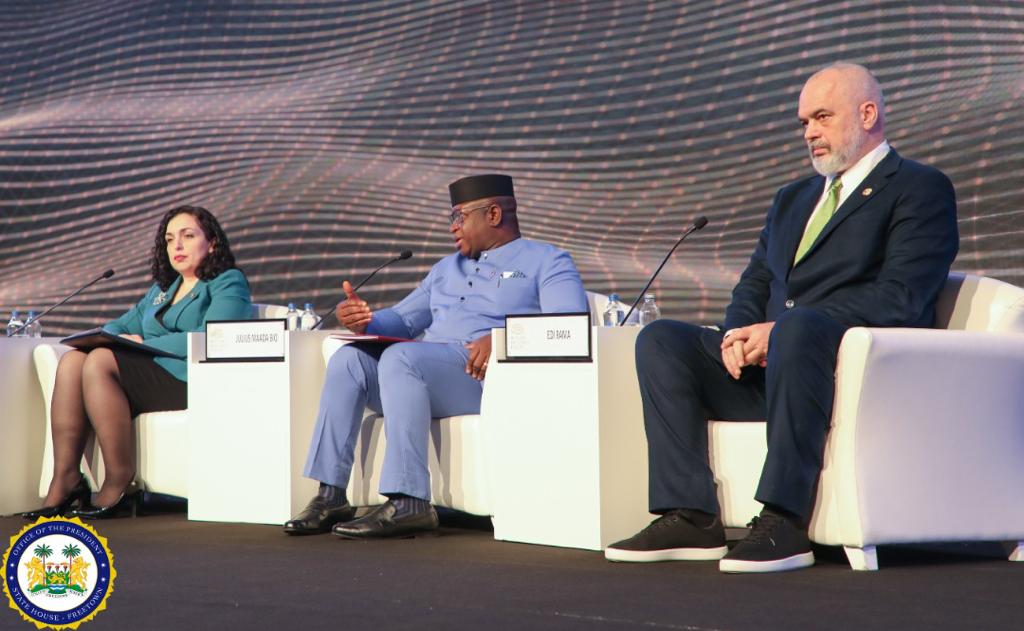
Sierra Leone's President H.E. Maada Bio (C)
This panel highlighted that an environment of sustained peace and stability is conducive for economic development, prosperity and progress. It demonstrated that the wider the area of influence of environment, the easier it would be to attain sustainable peace and prosperity. It therefore stressed the fundamental need for nations to unite around the notion of peace, in order to collectively benefit from the dividends of prosperity. The panel recommended the establishing of regional and global interdependencies whereby every nation and region’s potential is fully utilized for the reciprocal benefit of all. The panel addressed the following issues;
- The possibilities of overcoming economic, social and cultural differences in creating interdependence,
- The establishment of pathways for peace and prosperity to contradict the notions of sovereignty and national interest,
- To overcome deep-rooted mistrust, misconceptions and prejudices for regional and global peace and prosperity to prevail.
The Minister of Foreign Affairs and International Cooperation was one of the panellists to discuss on ‘Fighting Racism and Discrimination’.
This panel informed that prevention of racism and discrimination is enshrined in international human rights instruments. It therefore noted that eradicating discrimination in the public and private spheres is an obligation for all states. It recommended that the struggles against racism and all forms of discrimination should be a priority for the international community.
It further noted that populist rhetoric, racism, xenophobia and intolerance are on the increase and threatening global common values, as well as the peace and harmony of societies. It was cited that various manifestations of racism and discrimination occur on a daily basis, deterring the efforts of integration within societies. A formidable political will and a determined and comprehensive approach was recommended.
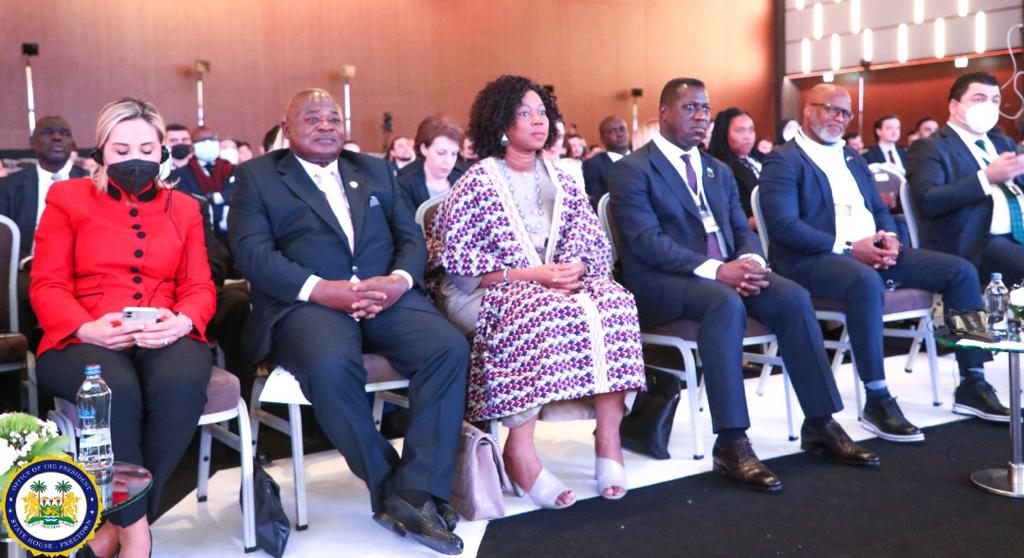
(L-R) Sierra Leone's Finance Minister, Sierra Leone's First Lady H.E. Fatima Maada Bio, Sierra Leone's Minister of Foreign Affairs and International Cooperation, and Ambassador Mohamed H. Kaisamba
The panel addressed the problem of racism, racial discrimination, xenophobia and related intolerance. It also discussed methods of countering the challenges ahead. Panellists reiterated measures that can effectively counter discrimination.
They also discussed the methods through which global and comprehensive actions can be taken against growing inequalities, discrimination, intolerance and hate against religion, as well as the manners in which politicians and the media can contribute to combat these negative trends.
The Minister of Foreign Affairs and International Cooperation was also a panellist to discuss on ‘Recoding Diplomacy.
This panel noted that recoding diplomacy encompasses finding effective ways to harmonize national interests with renewed language, insight and impact, while making extensive use of rapidly changing and innovative digital capabilities.
It indicated that diplomacy is in constant transformation, and it ways and means are also evolving. In view of this, it was pointed out that the number of diplomatic actors has been growing and constantly diversifying.
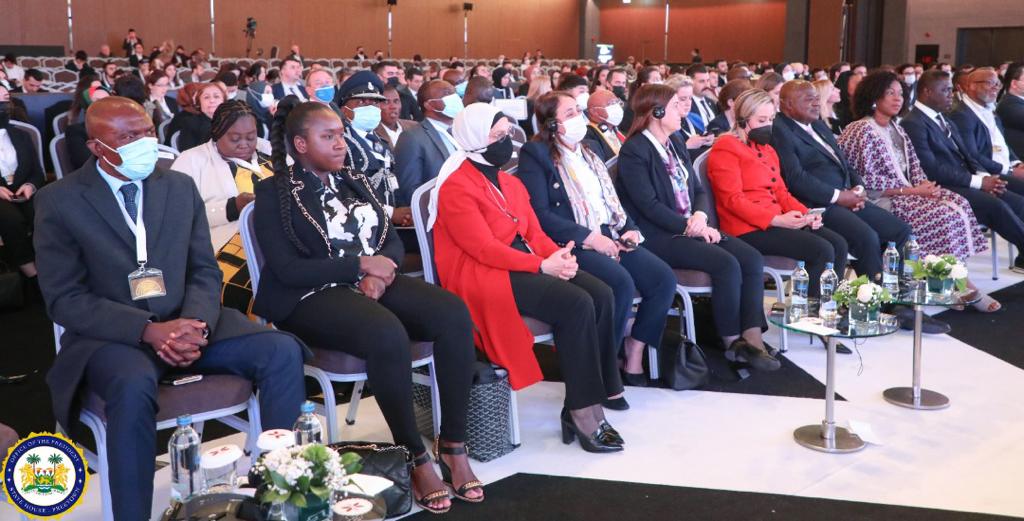
The panel discussed on the need for transformation to become more imminent as a result of fluctuations in international system, regional crises, and shifts in power balances coupled with global crises like Covid-19 pandemic. It therefore recommended that shifts in the relation between state and the individual as well as technological innovations require special attention.
Given the entering of the international system in an era of transformation, the panel discussed the needs for robust and effective diplomacy to manage the change, resolve tensions, facilitate adaptation to new realities and promote cooperation. It therefore called for an all-out effort towards re-evaluation, reaffirmation, restoration, in other words a recoding diplomacy.